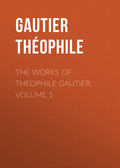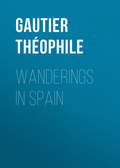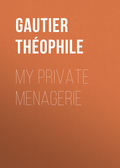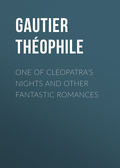полная версия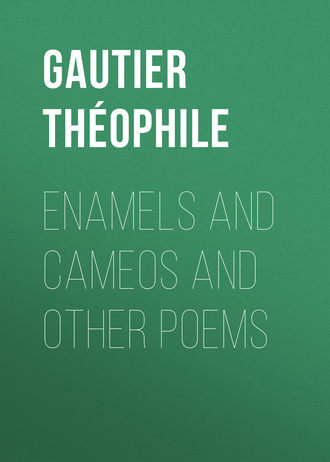

Gautier Théophile
Enamels and Cameos and other Poems
THE GOD AND THE OPAL
TO THÉOPHILE GAUTIER
Gray caught he from the cloud, and green from earth,
And from a human breast the fire he drew,
And life and death were blended in one dew.
A sunbeam golden with the morning's mirth,
A wan, salt phantom from the sea, a girth
Of silver from the moon, shot colour through
The soul invisible, until it grew
To fulness, and the Opal Song had birth.
And then the god became the artisan.
With rarest skill he made his gem to glow,
Carving and shaping it to beauty such
That down the cycles it shall gleam to man,
And evermore man's wonderment shall know
The perfect finish, the immortal touch.
Agnes Lee.
PREFACE
When empires lay riven apart,
Fared Goethe at battle time's thunder
To fragrant oases of art,
To weave his Divan into wonder.
Leaving Shakespeare, he pondered the note
Of Nisami, and heard in his leisure
The hoopoe's weird monody float,
And set it to soft Orient measure.
As Goethe at Weimar delayed
And dreamed in the fair garden closes,
And, questing in sun or in shade,
With Hafiz plucked redolent roses, —
I, closed from the tempest that shook
My window with fury impassioned,
Sat dreaming, and, safe in my nook,
Enamels and Cameos fashioned.
AFFINITY – A PANTHEISTIC MADRIGAL
On an ancient temple gleaming,
Two great blocks of marble high
Thrice a thousand years lay dreaming
Dreams against an Attic sky.
Set within one silver whiteness,
Two wave-tears for Venus shed,
Two fair pearls of orient brightness,
Through the waste of water sped.
In the Generalife's fresh closes,
By a Moorish light illumed,
Two delicious, tender roses
By a fountain met and bloomed.
In the balm of May's bright weather,
Where the domes of Venice rise,
Lighted on Love's nest together
Two pale doves from azure skies.
All things vanish into wonder,
Marble, pearl, dove, rose on tree,
Pearl shall melt and marble sunder,
Flower shall fade and bird shall flee!
Not a smallest part but lowly
Through the crucible must pass,
Where all shapes are molten slowly
In the universal mass.
Then as gradual Time discloses
Marbles melt to whitest skin,
Roses red to lips of roses,
And anew the lives begin.
And again the doves are plighted
In the hearts of lovers, while
Ocean pearls are reunited,
Set within a coral smile.
Thus affinity comes welling;
By its beauty everywhere
Soul a sister-soul foretelling,
All awakened and aware.
Quickened by a zephyr sunny,
Or a perfume, subtlewise,
As the bee unto the honey,
Atom unto atom flies.
And remembered are the hours
In the temple, down the blue,
And the talks amid the flowers,
Near the fount of crystal dew,
Kisses warm, and on the royal
Golden domes the wings that beat;
For the atoms all are loyal,
And again must love and greet.
Love forgotten wakes imperious,
For the past is never dead,
And the rose with joy delirious
Breathes again from lips of red.
Marble on the flesh of maiden
Feels its own white bloom, and faint
Knows the dove a murmur laden
With the echo of its plaint,
Till resistance giveth over,
And the barriers fall undone,
And the stranger is the lover,
And affinity hath won!
You before whose face I tremble,
Say – what past we know not of
Called our fates to reassemble, —
Pearl or marble, rose or dove?
THE POEM OF WOMAN MARBLE OF PAROS
Unto the dreamer once whose heart she had,
As she was showing forth her treasures rare,
Minded she was to read a poem fair,
The poem of her form with beauty glad.
First stately and superb she swept before
His gazing eyes, with high, Infanta mien,
Trailing behind her all the splendid sheen
Of nacarat floods of velvet that she wore.
Thus at the opera had he watched her bend
From out her box, her body one bright flame,
When all the air was ringing with her name,
And every song made her fair praise ascend.
Then had her art another way, for look!
The weighty velvet dropped, and in its place
A pale and cloudy fabric proved the grace
Of every line her glowing body took;
Till softly from her shoulder marble-sweet
The veil diaphanous fell, the folds whereof
Came fluttering downward like a snowy dove,
To nestle in the wonder of her feet.
She posed as for Apelles pridefully,
A lovely flesh and marble womanhood: —
Anadyomene, she upright stood
Naked upon the margent of the sea.
Fairer than any foam-drops crystalline,
Great pearls of Venice lay upon her breast,
Jewels of milky wonder lightly pressed
Upon the cool, fresh satin of her skin.
Exhaustless as the waves that kiss the brim,
Under the gleaming moon of many moods,
Were all the strophes of her attitudes.
What fascination sang her beauty's hymn!
But soon, grown weary of an art antique,
Of Phidias and of Venus, lo! again
Within another new and plastic strain
She grouped her charms unveiled and unique.
Upon a cashmere opulently spread,
Sultana of Seraglio then she lay,
Laughing unto her little mirror gay,
That laughed again with lips of coral red;
The indolent, soft Georgian, posturing
With her long, supple narghile at lip,
Showing the glorious fashion of her hip,
One foot upon the other languishing.
And, like to Ingres' Odalisque, supine,
Defying prurient modesty turned she,
Displaying in her beauty candidly
Wonder of curve and purity of line.
But hence, thou idle Odalisque! for life
Hath now its own fair picture to display —
The diamond in its rare effulgent ray, —
Beauty in Love hath reached its blossom rife.
She sways her body, bendeth back her head.
Her breathing comes more subtle and more fast.
Rocked in her dream's alluring arms, at last
Down hath she fallen upon her costly bed.
Her eyelids beat like fluttering pinions lit
Upon the darkened silver of her eyes.
Her bright, voluptuous glances upward rise
Into the vague and nacreous infinite.
Deck her with sweet, lush violets, instead
Of death-flowers with their every pearl a tear;
Scatter their purple clusters on her bier,
Who of her being's ecstasy lies dead.
And bear her very gently to her tomb —
Her bed of white. There let the poet stay,
Long hours upon his bended knees to pray,
When night shall close around the funeral room.
A STUDY OF HANDS
I
IMPERIA
A sculptor showed to me one day
A hand, a Cleopatra's lure,
Or an Aspasia's, cast in clay,
Of masterwork a fragment pure.
Seized in a snowy kiss, and fair
As lily in the argent rise
Of dawn, like whitest poem there
Its beauty lay before mine eyes,
Bright in its pallor lustreless,
Reposing on a velvet bed,
Its fingers, weighted with their dress
Of jewels, delicately spread.
A little parted lay the thumb,
Showing the undulating line,
Beautiful, graceful, subtlesome,
Of its proud contour Florentine.
Strange hand! I wonder if it toyed
In silken locks of Don Juan,
Or on a gem-bright caftan joyed
To stroke the beard of some soldan;
Whether, as courtesan or queen,
Within its fingers fair and slight
Was pleasure's gilded sceptre seen,
Or sceptre of a royal might!
But sweet and firm it must have lain
Full oft its touch of power rare
Upon the curling lion-mane
Of some chimera caught in air.
Imperial, idle fantasy,
And love of soft, luxurious things,
Frenzies of passion, wondrous, free,
Impossible dream-flutterings!
Romances wild, and poesy
Of hasheech and of wine, vain speeds
Beneath Bohemia's brilliant sky
On unrestrained and maddened steeds!
All these were in the lines of it,
Of that white book with magic scrolled,
Where ciphers stood, by Venus writ,
That Love had trembled to behold.
II
LACENAIRE
Strange contrast was the severed hand
Of Lacenaire, the murderer dead,
Soaked in a powerful essence, and
Near by upon a cushion spread.
Letting a morbid fancy win,
I touched, despite my loathing sane,
The cold, hair-covered, slimy skin,
Not yet washed clean of deathly stain.
Yellow, uncanny, mummified,
Like to a Pharaoh's hand it lay,
And stretched its faun-shaped fingers wide,
Crisp with temptation's awful play;
As though an itch for flesh and gold
Lured them to horrors yet to be,
Twisting them roughly as of old,
Teasing their immobility.
There every vice and passion's whim
Had seamed the flesh abundantly
With hideous hieroglyphs and grim,
That headsmen read with fluency.
There plainly writ in furrows fell,
I saw the deeds of sin and soil,
Scorchings from every fiery hell
Wherein corruptions seethe and boil.
There was a track of Capri's vice,
Of lupanars and gaming-scores,
Fretted with wine and blood and dice,
Like ennui of old emperors.
Supple and fierce, it had some dower
Of grace unto the searching eye,
Some brutal fascination's power,
A gladiator's mastery.
Cold aristocracy of crime!
No plane inured, no hammer spent
The hand whose task for every time
Had but the knife for implement.
The hand of Lacenaire! No clue
Therein to labour's honest pride!
False poet, and assassin true,
The Manfred of the gutter died!
Romances wild, and poesy
Of hasheech and of wine, vain speeds
Beneath Bohemia's brilliant sky
On unrestrained and maddened steeds!
VARIATIONS ON THE CARNIVAL OF VENICE
I
ON THE STREET
There is a popular old air
That every fiddler loves to scrape.
'T is wrung from organs everywhere,
To barking dog with wrath agape.
The music-box has registered
Its phrases garbled and reviled.
'T is classic to the household bird;
Grandmother learned it as a child.
The trumpet and the clarinet,
In dusty gardens of the dance,
Blow it to clerk and gay grisette,
In shrill, unlovely resonance.
And of a Sunday swarm the folk
Under the honeysuckle vine,
Quaffing, the while they talk and smoke,
The sun, the melody, the wine.
It lurks within the wry bassoon
The blind man plays, the porch beneath.
His poodle whimpers low the tune,
And holds the cup between its teeth.
The players of the light guitar,
Decked with their flimsy tartans, pale,
With voices sad, where feasters are,
Through coffee-houses fling its wail.
Great Paganini at a sign,
One night, as with a needle's gleam,
Picked up with end of bow divine
The little antiquated theme,
And, threading it with fingers deft,
He broidered it with colours bright,
Till up and down the faded weft
Ran golden arabesques of light.
II
ON THE LAGOONS
Tra la, tra la, la, la, la, – who
Knows not the theme's soft spell?
Or sad or light or mock or true,
Our mothers loved it well.
The Carnival of Venice! Long
Adown canals it came,
Till, wafted on a zephyr's song,
The ballet kept its fame.
I seem, whene'er its phrase I hear,
A gondola to view,
With prow voluted, black and clear,
Slip o'er the water blue;
To see, her bosom covered o'er
With pearls, her body suave,
The Adriatic Venus soar
On sound's chromatic wave.
The domes that on the water dwell
Pursue the melody
In clear-drawn cadences, and swell
Like breasts of love that sigh.
My chains around a pillar cast,
I land before a fair
And rosy-pale facade at last,
Upon a marble stair.
Oh! all dear Venice with her towers,
Her boats, her masquers boon,
Her sweet chagrins, her mad, gay hours,
Throbs in that ancient tune.
The tenuous, vibrant chords that smite,
Rebuild in subtle way
The city joyous, free and light
Of Canaletto's day!
III
CARNIVAL
Venice robes her for the ball;
Decked with spangles bright,
Multi-coloured Carnival
Teems with laughter light.
Harlequin with negro mask,
Tights of serpent hue,
Beateth with a note fantasque
His Cassander true.
Flapping loose his long, white sleeve,
Like a penguin spread,
Through a subtle semibreve
Pierrot thrusts his head.
Sleek Bologna's doctor goes
Maundering on a bass.
Punchinello finds for nose
Quaver on his face.
Hurtling Trivellino fine,
On a trill intent,
Scaramouch to Columbine
Gives the fan she lent.
Gliding to the tune, I mark
One veiled figure rise,
While through satin lashes dark
Luring gleam her eyes.
Tender little edge of lace,
Heaving with her breath!
"Under is her own dear face!"
An arpeggio saith.
And beneath the mask I know
Bloom of rosy lips,
And the patch on chin of snow,
As she by me trips!
IV
MOONLIGHT
Amid the chatter gay and mad
Saint Mark to Lido wafts, a tune
Like as a rocket riseth glad
As fountain riseth to the moon.
But in that air with laughter stirred,
That shakes its bells far out to sea,
Regret, a little stifled bird,
Mingles its frail sob audibly.
And in a mist of memory clad,
Like dream well-nigh effaced, I view
The sweet Beloved, fair and sad,
Of dear, long-vanished days I knew.
Ah, pale she is! My soul in tears
An April day remembers yet: —
We sought the violets by the meres,
And in the grass our fingers met..
The vibrant note of violin
Is the child voice that struck my heart,
Exquisite, plaintive, argentine,
With all the anguish of its dart.
So sweetly, falsely, doth it steal,
So cruel, yet so tender, too,
So cold, so burning, that I feel
A deadly pleasure pierce me through;
Until my heart, an archway deep
Whose waters feed the fountain's lip,
Lets tears of blood in silence weep
Into my bosom drip by drip.
O Carnival of Venice! – theme
So chilling sad, yet ever warm!
Where laughter toucheth tears supreme, —
How hast thou hurt me with thy charm!



